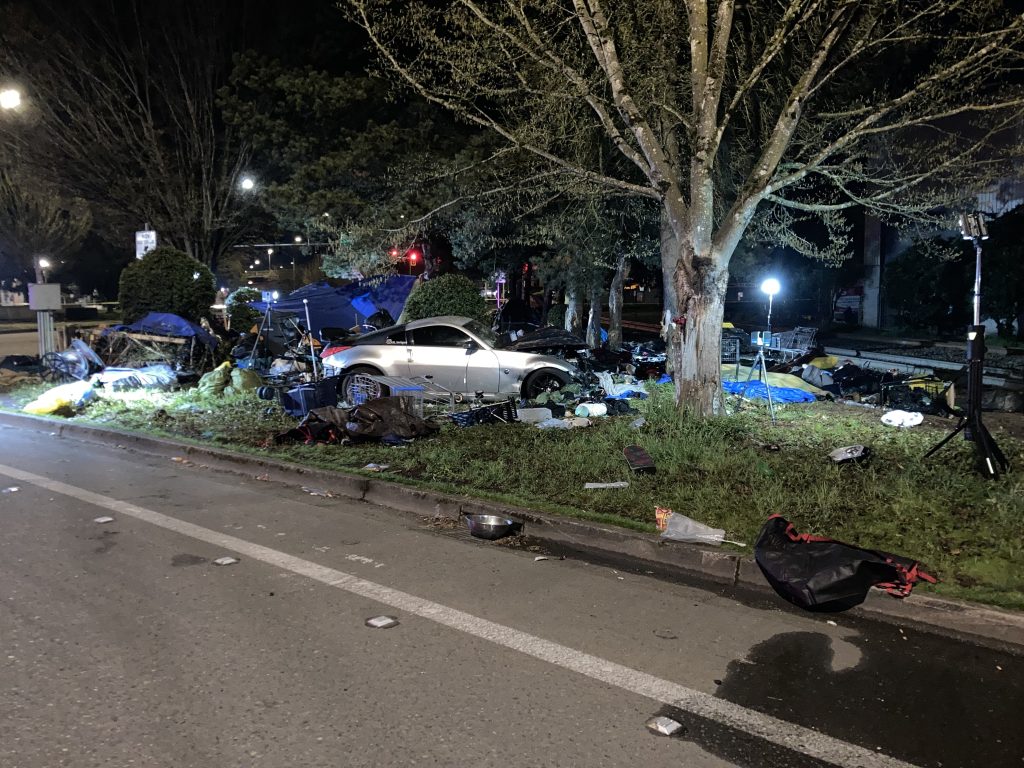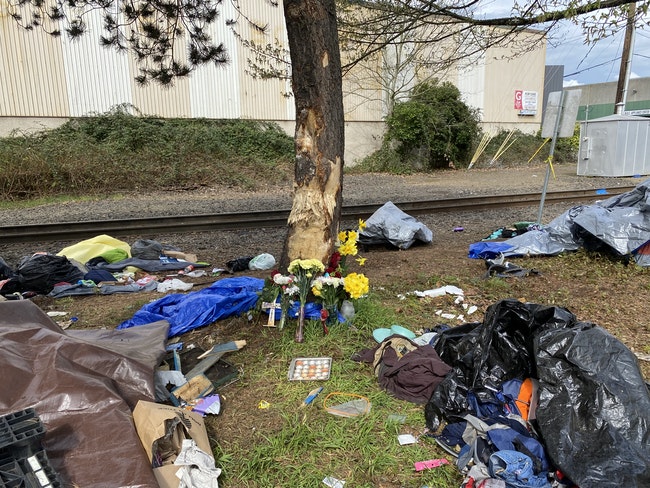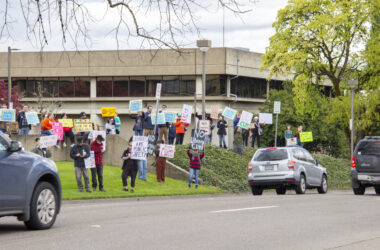A Marion County judge on Wednesday sentenced Enrique Rodriguez Jr., to 25 years and 10 months in prison after he pleaded guilty to driving drunk through a downtown homeless encampment last spring, killing four people.
Marion County Circuit Judge Lindsay Partridge sentenced Rodriguez, 25, to 18 years of post-prison supervision following his release. He will receive credit for time and also has to pay $3,078 in restitution.
The sentencing comes over two months after Rodriguez pleaded guilty to four counts of first-degree manslaughter, two counts of second-degree assault, driving under the influence, reckless driving and three counts of recklessly endangering another person, according to court records.
The crash on March 27, 2022, killed Jowand Beck, 24, Luke Kagey, 21, Joe Posada III, 54, and Rochelle Zamacona, 29, and seriously injured two others.
At the court hearing Wednesday, Marion County District Attorney Paige Clarkson read a statement by Kagey’s parents, Lane and Diane Kagey, who said they cherish the last words their son texted them shortly before his death. “Phone at 1%, love you,” he wrote.
“Months later, our tears keep flowing. Our lives have changed forever,” they said in the statement.
“His choices have consequences for him and for others,” they said of Rodriguez. “Taking a human life, is there a worse crime that can be committed? May justice be served.”
Audrey Kagey, Luke’s sister-in-law, asked the judge to give Rodriguez the maximum sentence possible. In a statement read by Clarkson, she said that she believed if Rodriguez had met her brother-in-law, “he would’ve been your best friend.”
“I have no doubt the thought has come to your mind that because these people were homeless, they were less human. You could not be more wrong,” she told Rodriguez.
Rochelle Zamacona’s father, Eddie Zamacona, said at the hearing that he has “a big hole” in his heart. “You took my daughter from me,” he told Rodriguez.
He said he didn’t understand why Rodriguez hadn’t asked for forgiveness. “I don’t know how you go being a human being like you are,” he said.
Sonia Zamacona, Rochelle’s mother, showed pictures of her daughter to those in the courtroom.
Rochelle went to school in Sweet Home. She later had a “breakdown,” her mother said, after her parents divorced and was diagnosed with bipolar disorder. She said Rochelle could have lived with either of her parents but chose to live at the camp after not finding the mental health resources she needed in Oregon.
“What you did was the worst thing anyone could ever do to a parent,” she told Rodriguez, adding that she wakes up every day and looks at a picture of her daughter.
She told Rodriguez that his parents would still get to see him in prison.
“I’m not going to be able to go see my daughter,” she said. “I hope they give you 30 years, because by then I’ll be dead and I won’t think anymore about what you did to my daughter and those three other people who were there.”

Rodriguez’ attorney, Zach Causey, asked the judge to impose a 10-year sentence, saying that Rodriguez took responsibility for his actions, had no prior criminal history and had taken advantage of The Pathfinder Network, which helps people impacted by the criminal justice system re-enter their communities, while in jail. He said Rodriguez worked most recently as a manager at Autozone.
Rodriguez faced the victims’ families when making a statement ahead of his sentencing.
“I am sorry to have taken something away from all of you,” before naming each victim of the crash. “How can I try and make someone see that I’m a good person when I’ve done something so wrong?”
He said he should have been home with his kids the night of the crash and should not have gotten behind the wheel. “I’ve been blind to the fact that my life should’ve stopped being about me seven years ago when my son was born.”
“I would never want or intend to hurt anyone the way I did, not even my worst enemy,” he said.
Partridge said at the hearing that it struck him “how stupid and senseless this is” and the number of people impacted by an act that occurred in such a short amount of time. He said it was clear based on emails from people who knew Rodriguez that he showed good character when sober.
Partridge said he wanted to send the message to the community that no one can drink as much alcohol as Rodriguez did, get behind the wheel, “hit the accelerator and go flying down the street.”
He said Rodriguez had no criminal history but a poor driving record, and his license was suspended at the time of the crash.
“You drink and you get behind the wheel of a car, you are playing Russian roulette,” Partridge said.
The judge said he believed Rodriguez was remorseful.
“I’m not sure what justice is. There is no justice,” Partridge said. “If there was justice, you’d have your daughter back. You’d have your son back.”
The night of the crash
A memorandum filed Monday by Clarkson included an excerpt from a Salem Police Department report detailing what led up to the crash and the immediate aftermath.
Police determined that Rodriguez was driving his Nissan 300ZX at illegally fast speeds around the curve in the road near Marion Square Park and Gilbert House, with one witness estimating Rodriguez’s speed at 65 miles per hour.
Earlier in the night, Rodriguez had been partying at a friend’s house where he got drunk before driving to a downtown Salem bar, according to the memorandum.
His car was parked under a security camera at Salem Summit Company, a nearby sporting goods store. The camera captured him parking next to his friend, drinking from a bottle of alcohol and then proceeding toward the Night Deposit bar, Clarkson wrote.
At the bar, Rodriguez continued to drink alcohol and got in a verbal argument with an ex-girlfriend. He left the bar just before closing and was captured on video “acting recklessly, driving up on the curb and nearly hitting a friend,” the memorandum said. He then drove west to Northeast Front Street, turned north, left the roadway, crossed the center median, and careened into the homeless encampment on the west side of the road.
According to the memorandum, Rodriguez was disoriented after the crash, asking people not to call the police while also crying.
He told police in an interview at the hospital that some homeless people had walked out in front of his car.
“He initially showed concern for the deceased until he was refused an opportunity to smoke a cigarette or use his phone,” Clarkson wrote. Rodriguez then became enraged, calling the officer obscenities and disrupting “the entire Emergency Department.”
A blood draw about one hour after the crash at 3 a.m. showed Rodriguez’s blood-alcohol level was 0.224, nearly three times the legal limit of 0.08.
“To describe the initial scene as chaotic is a gross understatement,” Clarkson wrote in the memorandum.
As soon as police arrived, witnesses and people on the scene began yelling at officers to direct them to people injured in the crash, according to the police report. Police noted there were a large number of tents and makeshift structures along the road between the sidewalk and train tracks, and a gray car was off the road in the middle of the encampment.
“I have no doubt the thought has come to your mind that because these people were homeless, they were less human. You could not be more wrong.”
Audrey Kagey, Luke Kagey’s sister-in-law, told Enrique Rodriguez, Jr. at his sentencing Wednesday.
Officers saw a man lying unconscious behind the car with a compound fracture to one of his legs. A woman later identified as Savannah Miller was laying `on her back in front of the car and bleeding from her face, appearing unable to move and screaming in fear and pain.
She was eventually able to move one arm enough to motion to her left side to a person next to her, who police hadn’t yet noticed was trapped under the car. Officers saw movement under some tarps and a mangled tent, the report said.
Police cut away at the fabric until they saw a victim they believed was Kagey, whose face was “badly injured,” moving around and trying to talk.
“The scene became somewhat less chaotic, but there was so much debris, it was difficult to assess the situation. As officers on scene continued to sift through the garbage, tarps, and sleeping bags we located three other victims,” the report said.
Police reported finding Posada’s body on his back and noted graphic injuries.
Officers then found Rochelle Zamacona injured under some debris. She was taken to the hospital and where she died.
A moment after she was transported to the emergency room, police came across Beck lying on his right side and no pulse.
Miller and Derrick Hart survived with serious injuries, according to the memorandum. Hart was hospitalized for a month before being placed in a rehabilitation center for another two months. Miller suffered broken ribs and liver lacerations.
“Given the enormity of the scene and the obvious destruction, it is incredible that more life was not lost,” Clarkson wrote in the memorandum.
Jimmy Jones, executive director of the Mid-Willamette Valley Community Action Agency, told Salem Reporter following the crash that he expected state legislators during the 2023 session to consider requiring cities and counties to set aside property for managed or unmanaged camping.
City councilors at the time described the fatal crash as both a tragedy and a symptom of the homeless crisis in Salem.
PREVIOUS COVERAGE:
Man indicted on additional charges in crash that killed four in Salem homeless camp
Man arrested after crash that killed four in Salem homeless camp, police say
Contact reporter Ardeshir Tabrizian: [email protected] or 503-929-3053.
JUST THE FACTS, FOR SALEM – We report on your community with care and depth, fairness and accuracy. Get local news that matters to you. Subscribe to Salem Reporter. Click I want to subscribe!

Ardeshir Tabrizian has covered criminal justice and housing for Salem Reporter since September 2021. As an Oregon native, his award-winning watchdog journalism has traversed the state. He has done reporting for The Oregonian, Eugene Weekly and Malheur Enterprise.









